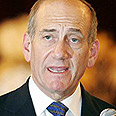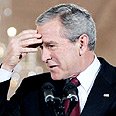

WASHINGTON – Iran must understand that if it fails to cooperate with the international community, it will “pay dearly”, Prime Minister Ehud Olmert said in an interview with the US weekly Newsweek on the eve of his Washington visit. Olmert addressed the Iranian threat, emphasized his will to renew dialogue with Palestinian President Mahmoud Abbas, and warned the Americans against a hasty exit from Iraq.
“This is the first time in many years that the official leader of a major nation with more than 70 million citizens has talked publicly and officially of the liquidation of another nation that is a member of the United Nations,” Olmert told Newsweek.
“(Iranian President Mahmoud) Ahmadinejad is a man who is ready to commit crimes against humanity, and he has to be stopped.
When Hitler began to talk about the liquidation of the Jewish race, people heard it. But they hardly did anything to stop it. And then for generations, nations and leaders had to explain why they didn't speak up. So we have to have a world campaign to emphasize the moral commitment that no one will be able to ignore what he says and what the possible ramifications may be.
The prime minister explained his support for a compromise that will strop Iran short from the technological threshold of developing nuclear capabilities, but added, “I don't believe that Iran will accept such compromise unless they have a very good reason to fear the consequences of not reaching it. In other words: Iran must start to fear.” Iran must understand that if it spurns international demands, it will end up “paying dearly.”
When questioned on plans to opt for a military solution, Olmert said: “think my words were clear enough. It is absolutely intolerable for Israel to accept the threat of a nuclear Iran. I prefer not to discuss the Israeli options. Israel has many options.”
Regarding the possibility of renewing dialogue with the Palestinians, Olmert noted, “The Palestinian issue is on the agenda. There is no way we can ignore it or that we would want to ignore it. We have to find the best partner to do it. A lot depends on the Palestinian leadership.”
As for Abbas, “He personally has shown consistently his opposition to terror and his discomfort with Hamas techniques. But it is incumbent upon him to do more than just say how uncomfortable he is with Hamas. He hasn't yet shown enough determination and inner strength to put down this government of terrorists and to reduce the influence of (Hamas leader) Khaled Mashal, who controls the officials of the Palestinian government from Damascus.”
Olmert added that test of the suggested unity government “can be measured by one criterion: Do they accept actively - not just in theory - the principles of the Quartet? If Hamas will formally accept these principles - which are to recognize Israel's right to exist, to end all terror and hostile activities against Israel and to recognize and implement all the agreements signed between Israel and the Palestinian Authority - then I'll be ready to sit down with such a government even if it includes Hamas representatives.”
In this regard Olmert reiterate his intention to free “many, many” Palestinian prisoners. “I made it clear long ago that I am anxious to open up a new dialogue with Abu Mazen (Abbas), and for that purpose, I'm ready to release many prisoners. Hamas's extreme inflexible attitude prevents the prisoners from being released because they refuse to let us have our soldier (kidnapped Israeli Cpl. Gilad Shalit)… Hamas is not really interested in the well-being of its prisoners. They want to topple Abu Mazen at any cost.”
Hizbullah? ‘Close to surrender’
Olmert defined the war in Lebanon as a “strategic, military and political success” and explained that it brought a renewal of Israel’s deterrent power against Hizbullah. “Unfortunately, before the war, we lacked what we thought we had - deterrence. They were not afraid of starting a fight with us because they thought our reaction would be entirely different. Now if you ask (Hizbullah leader Hassan) Nasrallah if he would want to repeat it, I'm sure his answer would be definitely not.
“I know for sure through different sources that Hezbollah was close to total surrender. Now the presence of the Lebanese army in the entire southern region, together with a robust international force, is very significant. It creates a reality entirely different to anything that existed before July 12.”
Olmert ruled out the possibility of dialogue with Syria under the current circumstances. “If Assad was serious, he would have stopped his total support of Khaled Mashaal, the man directly responsible for daily terrorist actions against Israel. I would be happy to negotiate with Bashar Assad, but on the basis of a certain environment, where you stop your support of terror and of Hizbullah. Assad doesn't show any sign that he's ready to do this.”
Iraq: Warning
During the interview, the prime minister also addressed the situation in Iraq, and the voices sounding in Washington hinting that an American withdrawal is near. A hasty pullout from Iraq, Olmert warns, could destabilize the moderate administrations in the Middle East.
Olmert is slated to land in Washington Sunday, where he will be hosted in the Blair House, the official presidential guest quarters opposite the White House. He will meet with US President George W. Bush Monday evening as well as with Vice President Dick Cheney, Secretary of State Condoleezza Rice, democratic and republican congressmen and Jewish elected officials.
Olmert warned that “If there is a premature pullout before Iraq has a robust government with a strong authority that can keep the country from collapsing into an internal civil war, America will have to think about the possible ramifications on neighboring Arab countries with moderate governments. How will it affect the stability of these countries against the radical forces that might flourish as a result of a premature pullout of America?”
It is not yet clear how Olmert’s statements will be received in the US, coming a few days after the congressional overhaul due to Americans’ dissatisfaction with the state of affairs in Iraq.















